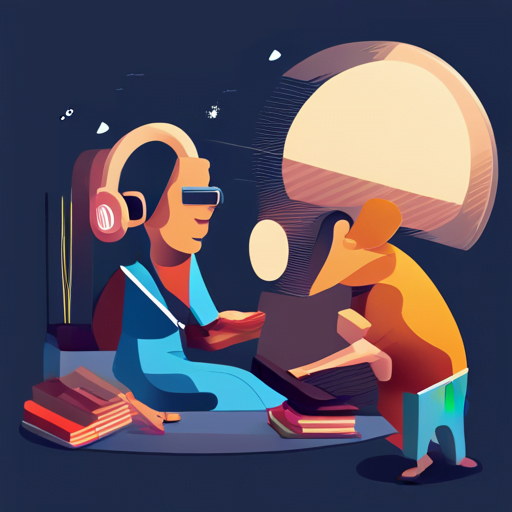Do you love listening to audiobooks but wonder if it can truly be considered reading? The debate surrounding this topic has been ongoing for years, with avid readers and audiobook enthusiasts both weighing in with their opinions.
While some argue that listening to audiobooks is not the same as reading, others believe that it can be just as effective in improving your knowledge and comprehension. In this article, we’ll explore both sides of the argument and delve into the cognitive processes involved in reading and listening, as well as the benefits and challenges of audiobooks.
As technology continues to evolve, audiobooks have become a popular alternative for those who want to consume literature but don’t have the time or energy to sit down with a physical book. With audiobooks, you can listen while commuting, doing household chores, or even while working out.
However, the question remains: can you truly say you’ve read a book if you’ve only listened to it? In this article, we’ll examine the different arguments surrounding this debate and help you come to your own conclusion on whether listening to audiobooks counts as reading.
Table of Contents
Defining the Terms: Reading and Listening

So, you’re wondering what exactly qualifies as ‘reading’ and ‘listening,’ huh? Well, let’s break it down.
Reading is the act of looking at and understanding written or printed words. It’s a visual process where the eyes scan the words on a page and the brain processes the information.
On the other hand, listening is the act of paying attention to and making sense of sound. It’s an auditory process where the ears receive the sounds and the brain processes the information.
When it comes to audiobooks, the information is still being processed by the brain, but the input is through the ears instead of the eyes. So, while it may not be traditional reading, it’s still a form of consuming and understanding information.
Cognitive Processes Involved in Reading and Listening

As you immerse yourself in a story, your mind conjures up vivid scenes and characters, transporting you to another world whether you’re reading or listening.
However, the cognitive processes involved in reading and listening are different. When you read, your brain creates mental images based on the words on the page. You use your imagination to visualize the characters, settings, and actions as described by the author. Reading also requires more active engagement from your brain, as you have to actively interpret and analyze the text to understand its meaning.
On the other hand, when you listen to an audiobook, your brain processes the information in a different way. You rely more on your auditory processing skills to understand the story. By listening, you’re able to hear the nuances of the author’s language, tone, and inflection, adding a layer of depth and emotion to the story.
However, listening to an audiobook also allows your mind to wander, which can be both a blessing and a curse. While it can be easier to relax and let the story wash over you, you may miss important details if your attention drifts.
The Impact of Audio on Reading

The incorporation of audio into the reading experience has brought about a new dimension of immersion and engagement for readers. Listening to audiobooks can help readers focus on the story and improve their comprehension skills.
Audio can provide intonation, pacing, and emphasis that can enhance the understanding of the text. However, it’s important to note that audio shouldn’t be used as a substitute for reading.
Reading involves a different set of cognitive processes, such as visualizing the story, decoding words, and understanding the syntax. Listening to audiobooks can support reading, but it shouldn’t replace it entirely.
Ultimately, whether listening to audiobooks counts as reading or not depends on the individual’s purpose and goals for reading.
Audiobooks vs. Physical Books

You might be surprised at how different your experience can be when you choose between physical books and audiobooks. Sure, both forms of media allow you to consume the same story, but the way you experience it can be vastly different.
With physical books, you have the ability to hold the book in your hands, feel the weight of it, and turn the pages. You can physically see the words on the page and allow your imagination to fill in the rest.
Audiobooks, on the other hand, allow you to sit back and relax while the story is read to you. The narrator’s voice can bring a new dimension to the story, making the characters come to life in a way that reading might not. However, you may miss out on the visual details that a physical book provides, and you may not be able to fully immerse yourself in the story if you are easily distracted.
Ultimately, both physical books and audiobooks have their own unique advantages and disadvantages, and it’s up to you to decide which one works best for you.
The Benefits of Audiobooks

Immersing yourself in a story through narration unlocks a new dimension of experience that complements the physical act of reading. Audiobooks offer a unique advantage, allowing you to multitask while enjoying a good book. You can listen to a great story while doing chores, exercising, or even driving to work. This makes audiobooks a convenient option for those with busy schedules who want to keep up with their reading habits.
Moreover, audiobooks improve listening skills and comprehension. Listening to a narrator’s voice inflections, tone, and pace can help you better understand the story’s nuances. It can also improve your vocabulary and pronunciation. Audiobooks are especially beneficial for those who struggle with reading or have visual impairments. They provide a way to access literature that would otherwise be inaccessible.
Overall, audiobooks can be an excellent addition to your reading habits, offering convenience and benefits that traditional reading can’t provide.
Challenges with Audiobooks

Now that you know the benefits of audiobooks, let’s talk about some challenges you may face while listening to them.
One of the biggest challenges is staying focused. Unlike reading a physical book, audiobooks require you to use your ears to absorb the content. This means you have to actively listen and pay attention to what’s being said. If your mind tends to wander or you get easily distracted, audiobooks may not be the best option for you.
Another challenge with audiobooks is that you can’t easily go back and reread a section if you didn’t fully grasp it the first time around. With physical books, you can simply flip back a few pages and reread the section. However, with audiobooks, you have to either rewind or start the entire section over again, which can be time-consuming and disrupt your overall listening experience.
Despite these challenges, many people still find audiobooks to be a convenient and enjoyable way to consume literature.
Considering the Debate

Imagine yourself sitting in a cozy armchair, with a cup of hot cocoa in hand, while the calming voice of your favorite author transports you to a different world – this is the magic of experiencing literature through audiobooks or physical books.
But the question remains, does listening to audiobooks count as reading? Many argue that listening to an audiobook is not the same as reading a physical book since it requires a different set of skills and engages different parts of the brain. However, others argue that the end goal is the same – to absorb the content of the book.
Ultimately, it comes down to personal preference and what works best for the individual reader. Whether you choose to read a physical book or listen to an audiobook, the most important thing is that you’re engaging with literature and expanding your knowledge and imagination.
Frequently Asked Questions
What are some common misconceptions about audiobooks?
You might think that listening to audiobooks is cheating or that it doesn’t count as real reading. However, this is a common misconception that many people have.
Audiobooks are a legitimate way to consume books, and they offer many benefits, such as convenience, accessibility, and the ability to multitask. Plus, listening to audiobooks still requires focus and attention, just like reading a physical book does.
So don’t let anyone tell you that listening to audiobooks is not real reading. Give it a try and see for yourself.
Are there any studies that compare the effectiveness of reading versus listening for comprehension and retention?
Looking for concrete evidence to prove that reading is more effective than listening?
There have been numerous studies comparing the two methods for comprehension and retention, and the results are mixed.
Some studies suggest that reading is better for retaining information, while others suggest that listening is just as effective.
In fact, some studies even suggest that listening can improve comprehension and retention in certain situations.
Ultimately, it depends on the individual and their preferences.
What matters most is that you’re engaging with the material and understanding it in a way that works best for you.
How do audiobooks impact language learning and development?
If you’re looking to improve your language skills, audiobooks can be a great tool for language learning and development. They can help improve your listening comprehension, pronunciation, and vocabulary. Additionally, audiobooks can be a convenient way to consume literature while on the go or when reading may not be possible.
However, it’s important to note that while audiobooks can be a useful supplement to reading, they shouldn’t be considered a replacement. Engaging with text through reading can help improve critical thinking skills and reading speed, which are important for academic and professional success.
What is the impact of audiobooks on children’s literacy and reading skills?
If you want to boost your child’s literacy and reading skills, audiobooks can make a great addition. Listening to audiobooks can help improve comprehension, vocabulary, and pronunciation. This is because audiobooks allow children to hear and learn new words in context, which can be particularly helpful for struggling readers.
Additionally, audiobooks can serve as a valuable tool for children with learning disabilities or visual impairments. So if you’re looking for a fun and effective way to enhance your child’s reading abilities, consider incorporating audiobooks into their routine.
How do audiobooks compare to other forms of media, such as podcasts and radio shows, in terms of cognitive engagement and learning?
When it comes to cognitive engagement and learning, audiobooks are a great option compared to other forms of media like podcasts and radio shows. With audiobooks, you can fully immerse yourself in a story or topic, allowing for a deeper understanding and retention of information. Plus, the act of listening can be a relaxing and enjoyable experience.
However, it’s important to note that audiobooks shouldn’t be seen as a replacement for reading, as actively reading can improve vocabulary, comprehension, and critical thinking skills. So while audiobooks may offer a different type of learning experience, they should be seen as a supplement to reading, not a replacement.
Conclusion
So, does listening to audiobooks count as reading? It depends on how you define reading.
While listening and reading both involve processing information, they engage different cognitive processes. Audiobooks can be a great option for people with visual impairments or busy schedules, but they may not be the best choice for everyone.
Ultimately, whether you consider listening to audiobooks as ‘reading’ is up to you. What matters most is that you’re engaging with literature and expanding your knowledge and imagination.
Whether you prefer to read physical books, listen to audiobooks, or do both, the important thing is that you’re making time for reading and reaping the many benefits it has to offer.
